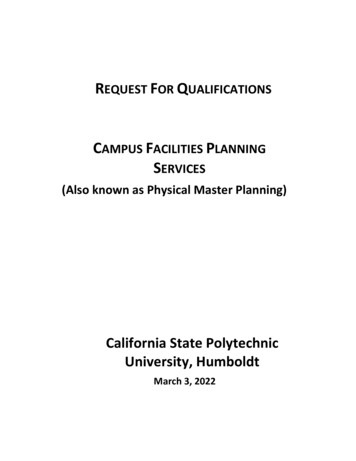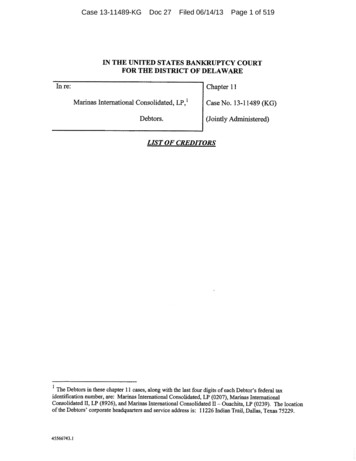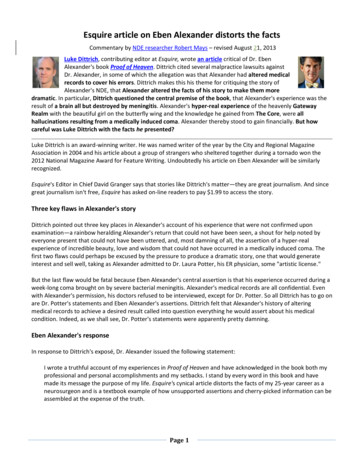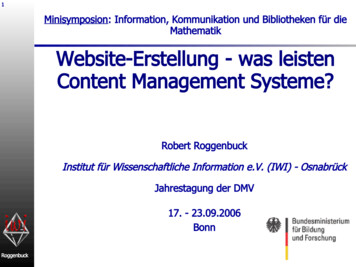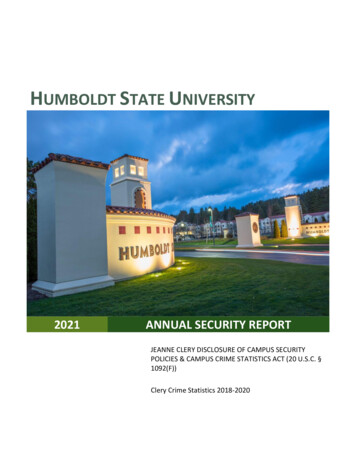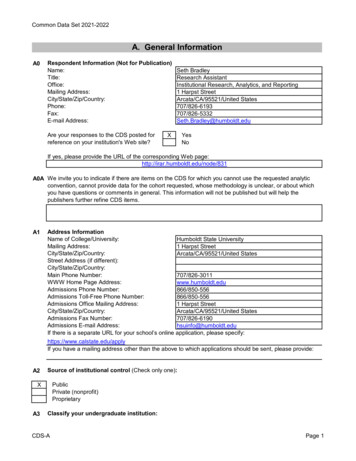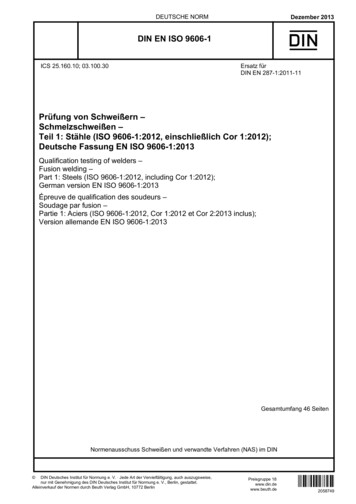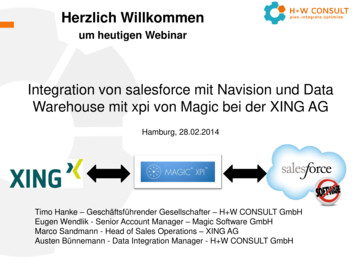
Transcription
Programm/ProgramHumboldt-Kolloquium“Global Research in the 21st Century:Perspectives of the U.S. Humboldt Network”2.–4. März 2017Washington, D.C., USAHumboldt Colloquium“Global Research in the 21st Century:Perspectives of the U.S. Humboldt Network”March 2–4, 2017Washington, D.C., USA1
2
Humboldt-Kolloquium“Global Research in the 21st Century:Perspectives of the U.S. Humboldt Network”2.–4. März 2017Washington, D.C., USAHumboldt Colloquium“Global Research in the 21st Century:Perspectives of the U.S. Humboldt Network”March 2–4, 2017Washington, D.C., USAIn Kooperation mit / in cooperation with:3
VorwortSehr geehrte Konferenzteilnehmer, liebe Humboldtianer, verehrte Gäste,die Alexander von Humboldt-Stiftung fördert die akademische Zusammenarbeithervorragender Wissenschaftlerinnen und Wissenschaftler aus Deutschland und Ländernin der ganzen Welt. Sie verleiht pro Jahr mehr als 700 Forschungsstipendien undForschungspreise an Einzelpersonen, die damit auf Lebenszeit Mitglied einerinternationalen Gemeinschaft von Spitzenforschern werden, dem „Humboldt-Netzwerk“.Derzeit leben rund 5.000 „Humboldtianer“ in den Vereinigten Staaten, viele davon inführenden Positionen an Universitäten, in Forschungseinrichtungen und anderenInstitutionen im ganzen Land. Als Humboldtianer teilen sie die gemeinsame Erfahrung dertransatlantischen Forschungszusammenarbeit mit Deutschland und spielen einebedeutende Rolle in Bezug auf die Ansätze zur Globalisierung der akademischen Bildungund der Forschung in den Vereinigten Staaten und Deutschland.Mit diesem Humboldt-Kolloquium möchte die Alexander von Humboldt-Stiftung dasfundierte Fachwissen des Humboldt-Netzwerks in den Vereinigten Staaten würdigen undMitgliedern des Netzwerks aus unterschiedlichen Bereichen und Generationen dieGelegenheit zu einem Dialog über die folgenden Schlüsselthemen der internationalenZusammenarbeit und Internationalisierung bieten: Wo stehen die Vereinigten Staaten undDeutschland in Bezug auf ihre Beteiligung am globalen Streben nach Wissen? Was könnendie beiden Länder voneinander lernen? Wie können Forschungseinrichtungen, organisationen und -gemeinschaften auf beiden Seiten des Atlantiks von der Expertise desHumboldt-Netzwerks profitieren, um die Chancen der Globalisierung zu nutzen und sichihren Herausforderungen zu stellen?Wir freuen uns sehr, dass Humboldtianer aus Forschungseinrichtungen quer durch dieVereinigten Staaten ebenso wie in den USA ansässige Nachwuchswissenschaftler zu denTeilnehmenden an unserer Tagung zählen. Letztere haben sich über einen öffentlichenAufruf um die Teilnahme beworben. Die jungen Wissenschaftlerinnen und Wissenschaftlerwerden die Zukunft der transatlantischen Forschungspartnerschaft mitgestalten. Ihnen giltdaher ein besonders herzliches Willkommen.Mein Dank gilt allen Personen und Einrichtungen, die die Vorbereitung der Tagung ndderUS-amerikanischenPartnerorganisation „American Friends of the Alexander von Humboldt Foundation“, deruns stets mit Rat und Tat zur Seite stand, den National Academies of Sciences, Engineeringand Medicine, der deutschen Botschaft und unseren deutschen Partnerorganisationen,namentlich der Deutschen Forschungsgemeinschaft und dem Deutschen AkademischenAustauschdienst. Des Weiteren danke ich allen Vortragenden, Sitzungsleitern undModeratoren für ihren jeweiligen Beitrag zum Programm und allen Teilnehmern für ihreZusage und Mitwirkung.4
5
EditorialDear Conference Participants, dear Humboldtians, dear Guests,The Alexander von Humboldt Foundation promotes academic cooperation betweenexcellent scientists and scholars from Germany and countries around the world. To thisend, it grants more than 700 research fellowships and research awards annually toindividual researchers who become life-long members of an international community ofdistinguished researchers, the so-called “Humboldt Network”. Roughly 5,000“Humboldtians” are currently based in the United States, many of them in leading positionsat universities, research organizations and other institutions across the country. AsHumboldtians, they share the common experience of transatlantic research collaborationwith Germany, and they are critical catalysts of approaches to the globalization of highereducation and research in the United States and Germany.With this Humboldt Colloquium, the Alexander von Humboldt Foundation seeks torecognize the profound expertise of the Humboldt community in the United States, bringingmembers of the network from different fields and generations together for a dialogue on keytopics of international cooperation and internationalization: Where do the United States andGermany stand with respect to participation in the global quest for knowledge? What canthe two countries learn from each other? How can research institutions, organizations,communities on both sides of the Atlantic benefit from the expertise of the HumboldtNetwork as they face the opportunities and challenges of globalization?We are very pleased that our conference participants include Humboldtians from researchinstitutions across the United States as well as U.S. based early career researchers whoresponded to a call for papers. This young generation of researchers will most certainly helpshape the future of the transatlantic research partnership, and I therefore wish to extend aspecial welcome to them.I wish to thank all individuals and institutions who provided valuable support in thepreparation of the meeting, especially the Board of Directors of the American Friends of theAlexander von Humboldt Foundation, who were always available for consultation andadvice, the National Academies of Sciences, Engineering and Medicine, the GermanEmbassy, and our German partner organizations, the German Research Foundation andGerman Academic Exchange Service. I also wish to thank all speakers, session chairs andpresenters for their contributions to the program and all participants for accepting ourinvitation.6
Ein Humboldt-Kolloquium in den Vereinigten Staaten ist ein recht seltenes Ereignis. Wirhoffen, dass das diesjährige Treffen des Humboldt-Netzwerks in diesem Land weit überdiese Konferenz hinaus nachwirken wird. Wir ermuntern alle Teilnehmer, neue Kontakte zuknüpfen und sich einzubringen und so zu Pflege und Ausbau der Forschungspartnerschaftunserer Länder und des aktiven Humboldt-Netzwerks in den kommenden Jahrenbeizutragen. Mit dieser Vision im Blick wünsche ich uns allen eine wunderbare Tagung!Präsident der Alexander von Humboldt-Stiftung7
A Humboldt Colloquium in the United States is a rather rare event. We hope that the impactof this year’s gathering on the Humboldt community in this country will reach far beyond theactual conference. We encourage all participants to make new contacts and to get involved,helping to sustain and expand the research partnership between our countries and theactive community of Humboldtians in future years to come. With this vision, I wish us all asplendid meeting!President of the Alexander von Humboldt Foundation8
ProgrammDonnerstag, 2. März 201712:00-15:30 UhrAnmeldung der TeilnehmendenNational AcademiesBuilding2101 ConstitutionAvenue14:00 UhrInformationsvorträge:Funding Opportunities for ResearchCollaborations with GermanyAuditoriumDr. Barbara SheldonAlexander von Humboldt-StiftungPeter KerriganDeutscher Akademischer AustauschdienstBettina SchuffertDeutsche Forschungsgemeinschaft16:00 ssor Dr. C. Daniel Mote, Jr.Präsident der National Academy ofEngineeringProfessor Dr. Helmut SchwarzPräsident der Alexander von HumboldtStiftungDr. Peter WittigBotschafter der Bundesrepublik Deutschland in denVereinigten Staaten9
ProgramThursday, March 2, 201712:00-3:30 p.m.Registration of the participantsNational AcademiesBuilding2101 ConstitutionAvenue2:00 p.m.Information Session:Funding Opportunities for ResearchCollaborations with GermanyAuditoriumDr. Barbara SheldonAlexander von Humboldt FoundationPeter KerriganGerman Academic Exchange ServiceBettina SchuffertGerman Research Foundation4:00 p.m.Opening CeremonyWelcome AddressesAuditoriumProfessor Dr. C. Daniel Mote, Jr.President of the National Academy of EngineeringProfessor Dr. Helmut SchwarzPresident of the Alexander von Humboldt FoundationDr. Peter WittigAmbassador of the Federal Republic of Germanyto the United States10
FestvorträgeProfessor Dr. Wolfgang KetterleMassachusetts Institute of Technology, Cambridge, MA, USA„Personal Perspectives of Basic Research – Germany, Humboldt,Einstein and Absolute Zero Temperature”Professorin Dr. Sharon Jeanette MacdonaldHumboldt-Universität zu Berlin, Deutschland„Making Differences in Berlin“anschließendEmpfangauf gemeinsame Einladung der National Academies, des Botschaftersder Bundesrepublik Deutschland in den Vereinigten Staaten und derAlexander von Humboldt-Stiftung11
Keynote LecturesProfessor Dr. Wolfgang KetterleMassachusetts Institute of Technology, Cambridge, MA, USA“Personal Perspectives of Basic Research – Germany, Humboldt,Einstein and Absolute Zero Temperature”Professor Dr. Sharon Jeanette MacdonaldHumboldt-Universität zu Berlin, Germany“Making Differences in Berlin“followed by12Receptionon joint invitation of the National Academies, the Ambassador ofthe Federal Republic of Germany to the United States and theAlexander von Humboldt Foundation
Freitag, 3. März 20179.00 UhrPlenum: Transatlantic Perspectives onGlobal Research: What can the UnitedStates and Germany learn from eachother?Moderation:Dr. Cathleen FisherAmerican Friends of the Alexander vonHumboldt FoundationRenaissanceWashington, D.C.Downtown HotelRaum Renaissance WestProfessor Dr. Steven V.W. BeckwithUniversity of California, Berkeley, CA, USAMichelle MünteferingMitglied des Deutschen Bundestages, Berlin, DeutschlandDr. Vaughan TurekianBerater für Forschung und Technologie imAußenministerium, USAProfessorin Dr. Kathrin ZippelNortheastern University, Boston, MA, USA10:00 UhrKaffee-/Tee- und NetzwerkpauseFoyer10:30 UhrSpotlight on Current Research and International ResearchCollaborations: Parallel Workshops with Presentations by Participants(s. S. 22)Fachgruppe 1:Raum 2Literatur, Sprachen, Kultur, PhilosophieModeration:Professorin Dr. Claudia OlkFreie Universität Berlin, DeutschlandCo-Moderation:Professorin Dr. Mary OleskiewiczUniversity of Massachusetts, Boston, MA, USA13
Friday, March 3, 20179:00 a.m.Plenary Session: TransatlanticPerspectives on Global Research: Whatcan the United States and Germany learnfrom each other?Chair:Dr. Cathleen FisherAmerican Friends of the Alexander vonHumboldt FoundationRenaissanceWashington, D.C.Downtown HotelRoom Renaissance WestProfessor Dr. Steven V.W. BeckwithUniversity of California, Berkeley, CA, USAMichelle MünteferingMember of the German Bundestag, Berlin, GermanyDr. Vaughan TurekianScience and Technology Adviser to theSecretary of State, USAProfessor Dr. Kathrin ZippelNortheastern University, Boston, MA, USA10:00 a.m.Coffee/Tea and Networking Break10:30 a.m.Spotlight on Current Research and International ResearchCollaborations: Parallel Workshops with Presentations by Participants(see p. 22)Section 1:Literature, Languages, Culture, PhilosophyChair:Professor Dr. Claudia OlkFree University of Berlin, GermanyCo-Chair:Professor Dr. Mary OleskiewiczUniversity of Massachusetts, Boston, MA, USA14FoyerRoom 2
Fachgruppe 2:Raum 3Geschichte, Recht, Wirtschaft, GesellschaftModeration:Professorin Dr. Andrea LenschowUniversität Osnabrück, DeutschlandCo-Moderation:Professorin Dr. Louise Karen Davidson-SchmichUniversity of Miami, FL, USAFachgruppe 3:Raum 4Gesundheits- und LebenswissenschaftenModeration:Professorin Dr. Leena Bruckner-TudermanUniversitätsklinikum Freiburg, DeutschlandCo-Moderation:Professorin Dr. Anamaris Colberg-Poley,Children’s National Health System, Washington, D.C., USAFachgruppe 4:ChemieModeration:Professor Dr. Oliver SeitzHumboldt-Universität zu Berlin, DeutschlandCo-Moderation:Professor Dr. Gregory H. Robinson,The University of Georgia, Athens, GA, USARaum 5Fachgruppe 5:Raum 10Physik, GeowissenschaftenModeration:Professor Dr. Rudolf O. GrossWalther-Meißner-Institut für Tieftemperaturforschung undTechnische Universität München, DeutschlandCo-Moderation:Professor Dr. Royce King-Ping ZiaVirginia Polytechnic Institute and State University, Blacksburg, VA, USA15
Section 2:History, Law, Economics, SocietyChair:Professor Dr. Andrea LenschowUniversity of Osnabrück, GermanyCo-Chair:Professor Dr. Louise Karen Davidson-SchmichUniversity of Miami, FL, USARoom 3Section 3:Room 4Health, Life SciencesChair:Professor Dr. Leena Bruckner-TudermanUniversity Medical Center Freiburg, GermanyCo-Chair:Professor Dr. Anamaris Colberg-PoleyChildren's National Health System, Washington, D.C., USASection 4:ChemistryChair:Professor Dr. Oliver SeitzHumboldt-Universität zu Berlin, GermanyCo-Chair:Professor Dr. Gregory H. RobinsonThe University of Georgia, Athens, GA, USARoom 5Section 5:Room 10Physics, GeosciencesChair:Professor Dr. Rudolf O. GrossWalther-Meißner-Institute for Low Temperature Research andTechnical University of Munich, GermanyCo-Chair:Professor Dr. Royce King-Ping ZiaVirginia Polytechnic Institute and State University, Blacksburg, VA, USAFachgruppe 6:Ingenieurwissenschaften, MathematikModeration:16Raum 12
Professor Dr. Stefan MüllerHausdorff Center for Mathematics, Universität Bonn,DeutschlandCo-Moderation:Professor Dr. Matthew Allen GraysonNorthwestern University, Evanston, IL, USA12:30 UhrMittagessen14:00 UhrPlenum: Building Research Careers andRaum RenaissancePartnerships in an Era of Global Science:WestWhat Impact Does International ExperienceHave on Career Paths and Opportunities?Moderation:Dr. Steffen MehlichLeiter der Abteilung Förderung und NetzwerkAlexander von Humboldt-StiftungCongressional BallroomProfessorin Dr. Therese CoryUniversity of Notre Dame, IN, USA„Old Texts, New Networks: Insights from a Stay in Germany”Professor Dr. Brian S. MitchellTulane University, New Orleans, LA, USA„Evaluating International ResearchExperiences”15:00 UhrPoster- und Netzwerk-Session (siehe S. 2737)mit Kaffee- und TeepauseRenaissance Ballroomund Foyer16:30 UhrSpotlight on Current Research andInternational Research Collaborations:Parallel Workshops with Presentations byParticipants continuedRäume wie amVormittag19:00 UhrAbendessen mit TischredeProfessor Dr. Myles JacksonNew York University, NY, USARenaissance Ballroom17
Section 6:Engineering, MathematicsChair:Room 12Professor Dr. Stefan MüllerHausdorff Center for Mathematics, University of Bonn,GermanyCo-Chair:Professor Dr. Matthew Allen GraysonNorthwestern University, Evanston, IL, USA12:30 p.m.LunchCongressional Ballroom2:00 p.m.Plenary Session: Building ResearchCareers and Partnerships in an Era ofGlobal Science: What Impact DoesInternational Experience Have on CareerPaths and Opportunities?Chair:Dr. Steffen MehlichHead of Department Sponsorship andNetworkAlexander von Humboldt-FoundationRoom RenaissanceWestProfessor Dr. Therese CoryUniversity of Notre Dame, IN, USA“Old Texts, New Networks: Insights from a Stay in Germany”Professor Dr. Brian S. MitchellTulane University, New Orleans, LA, USA“Evaluating International ResearchExperiences”3:00 p.m.Poster and Networking Session (see p. 2737)including Coffee and TeaRenaissance Ballroomand Foyer4:30 p.m.Spotlight on Current Research andInternational Research Collaborations:Parallel Workshops with Presentations byParticipants continuedRooms as in themorning18
7:00 p.m.Conference Dinner and Dinner SpeechProfessor Dr. Myles JacksonNew York University, NY, USARenaissance Ballroom19
Samstag, 4. März 20179:30 UhrPlenum:From Transatlantic to TrilateralCooperation: How Can the InternationalHumboldt Network Contribute toSustainable Global ResearchPartnerships?Moderation:Dr. Thomas HesseStellvertretender GeneralsekretärAlexander von Humboldt-StiftungRenaissanceWashington, D.C.Downtown HotelRaum Renaissance WestRebecca KeiserNational Science Foundation, Arlington, VA, USADr. Heather G. MarcoUniversity of Cape Town, SüdafrikaProfessor Dr. Jacob Kehinde OluponaHarvard University, Cambridge, MA, USA10:30 UhrKaffee-/Tee- und NetzwerkpauseFoyer11:00 UhrWorld Café und Abschlussplenum:Raum Renaissance EastVisions and Strategies for Future Engagementof U.S. Humboldtians (siehe S. 38)Moderation:Dr. Ulrike AlbrechtLeiterin Abteilung Strategie und AußenbeziehungenAlexander von Humboldt-StiftungEric KoenigAmerican Friends of theAlexander von Humboldt FoundationWorld Café-Moderatorin:Dr. Katrin AmianLeiterin des Referats Nordamerika, Australien, Neuseeland, OzeanienAlexander von Humboldt-Stiftung20
Saturday, March 4, 20179:30 a.m.Plenary Session:From Transatlantic to TrilateralCooperation: How Can the InternationalHumboldt Network Contribute toSustainable Global ResearchPartnerships?Chair:Dr. Thomas HesseDeputy Secretary GeneralAlexander von Humboldt FoundationRenaissanceWashington, D.C.Downtown HotelRoom Renaissance WestRebecca KeiserNational Science Foundation, Arlington, VA, USADr. Heather G. MarcoUniversity of Cape Town, South AfricaProfessor Dr. Jacob Kehinde OluponaHarvard University, Cambridge, MA, USA10:30 a.m.Coffee/Tea and Networking BreakFoyer11:00 a.m.World Café and Closing Plenary Session:Room RenaissanceEastVisions and Strategies for Future Engagementof U.S. Humboldtians (see page 38 for details)Chairs:Dr. Ulrike AlbrechtHead of Department Strategy and External RelationsAlexander von Humboldt FoundationEric KoenigAmerican Friends of theAlexander von Humboldt FoundationWorld Café Moderator:Dr. Katrin AmianHead of Division North America, Australia, New Zealand, OceaniaAlexander von Humboldt Foundation21
Rapporteure:Professor Dr. Joseph S. FranciscoUniversity of Nebraska, Lincoln, NE, USAProfessor Dr. Matthias VorwerkCatholic University of America, Washington, D.C., USAanschließendSchlussworteProfessor Dr. Helmut SchwarzPräsident der Alexander von Humboldt-StiftungRaum Renaissanceca. 13:00 UhrAbschiedsessenFoyer22
Rapporteurs:Professor Dr. Joseph S. FranciscoUniversity of Nebraska, Lincoln, NE, USAProfessor Dr. Matthias VorwerkCatholic University of America, Washington, D.C., USAfollowed byConcluding RemarksRoom RenaissanceProfessor Dr. Helmut SchwarzPresident of the Alexander von Humboldt Foundationca 1:00 p.m.Farewell LunchFoyer23
Interdisziplinäre Workshops mit Präsentationen derTeilnehmenden /Interdisciplinary Workshops with Presentations by ParticipantsIn den interdisziplinären Workshops sollen die aktuellen Forschungsarbeiten von Humboldt-Alumni undNachwuchswissenschaftlerinnen und Nachwuchswissenschaftlern in sechs definierten interdisziplinärenBereichen in den Mittelpunkt gestellt werden. Darüber hinaus bieten die Workshops ein Forum, um überaktuelle Forschungstrends, die wissenschaftliche Zusammenarbeit zwischen den USA und Deutschlandsowie Möglichkeiten der Forschungsfinanzierung zu diskutieren. Alle Teilnehmenden – Humboldt-Alumni,Nachwuchswissenschaftlerinnen und -wissenschaftler und Gäste – sind eingeladen, bei diesen Workshopsmitzuwirken.The aim of the interdisciplinary workshops is to spotlight current research by Humboldt alumni and earlycareer researchers in six loosely defined interdisciplinary areas. The workshops also provide a platform fordiscussing trends in current research, research collaboration between the United States and Germany aswell as research funding. All participants – Humboldt alumni, early career researchers and guests – areinvited to attend these workshops.Fachgruppe 1Section 1Literatur, Sprachen, Kultur, PhilosophieLiterature, Languages, Culture, PhilosophyRaum / Room 2Chairs:Professor Dr. Claudia Olk, Free University of Berlin, GermanyProfessor Dr. Mary Oleskiewicz, University of Massachusetts, Boston, MA, USAPresentations:Prof. Dr. Timothy O. Benson, Los Angeles County Museum of Art, CA, USA“World War I: The Global Media War - An International Research Collaboration“Prof. Dr. Jocelyn Holland, University of California, Santa Barbara, CA, USA“The Complex History of a Simple Tool: The Lever as Instrument of Reason“Dr. Hannah Eldridge, University of Wisconsin, Madison, WI, USA“The Claims of Meter: 1750, 1870, 1990”Prof. Dr. Martin Camargo, University of Illinois at Urbana-Champaign, IL, USA“Rhetoric in Late Medieval Oxford”Dr. Cameron Buckner, University of Houston, TX, USA“Can Nonhuman Animals Understand that Others Have Minds? An Update from RecentPhilosophical and Experimental Research”Prof. Dr. Svetoslava Slaveva-Griffin, Florida State University, Tallahassee, FL, USA“Thinking about the Body Globally”Prof. Dr. Stephen Matthew Brockmann, Carnegie Mellon University, Pittsburgh, PA, USA“New Developments in German Cinema Studies”24
James Howell, University of Arizona, Tucson, AZ, USA“Alexander von Humboldt and the Changing Landscape of Memory Studies”Fachgruppe 2Section 2Geschichte, Recht, Wirtschaft, GesellschaftHistory, Law, Economics, SocietyRaum / Room 3Chairs:Professor Dr. Andrea Lenschow, Osnabrück University, GermanyProfessor Dr. Louise Karen Davidson-Schmich, University of Miami, FL, USAPresentations:Prof. Dr. Hannah Luise Buxbaum, Indiana University, Bloomington, IN, USA“Mapping the Multinational Enterprise: The Challenges of Regulating Cross-BorderCorporate Activity”Prof. Dr. Joyce Marie Mushaben, University of Missouri, St. Louis, MO, USA“Becoming Madam Chancellor: Angela Merkel and the Berlin Republic“Dr. Christina Xydias, Clarkson University, Potsdam, NY, USA“The Conservative Woman: A Comparative Study of Germany and the United States”Prof. Dr. Eric Andrew Kurlander, Stetson University, Deland, FL, USA“Writing a Global (Transnational) History of Modern Germany in Global(Transnational) Collaboration”Prof. Dr. Robert M. Entman, George Washington University, Washington, D.C., USA“Inequality, Asymmetric Partisanship and Media Biases”Dr. Ayca Arkilic, The University of Texas at Austin / Huston-Tillotson University, Austin, TX,USA“Between the Homeland and Host States: Turkey’s Diaspora Policies and ImmigrantPolitical Participation in France and Germany”Prof. Dr. Christoph Dominik Güss, University of North Florida, Jacksonville, FL, USA“Creativity Across Cultures“Prof. Dr. Manfred Diehl, Colorado State University, Fort Collins, CO, USA“Changing Negative Views on Aging as a Psychological Mechanism to Motivate HealthyAging“Fachgruppe 3Section 3Gesundheits- und LebenswissenschaftenHealth, Life SciencesRaum / Room 4Chairs:Professor Dr. Leena Bruckner-Tuderman, University Medical Center Freiburg, GermanyProfessor Dr. Anamaris Colberg-Poley, Children’s National Health System, Washington,USA25
Presentations:Prof. Dr. Timothy George Bromage, New York University, NY, USA“Why I Make More Sense on Tuesdays: Non-Linear Discovery-Based Metabolic ResearchExplains How Life Works”Prof. Dr. Ingo Schlupp, University of Oklahoma, Norman, OK, USA“Social Context and Decision Making in an All-Female Species of Fish, the Amazon Molly”Prof. Dr. N. Louise Glass, University of California, Berkeley, CA, USA“The Small World of Microbial Communication”Krishna Mudumbi, Temple University, Philadelphia, PA, USA“Super-resolution Study of Nuclear Envelope Transmembrane Protein Transport in LiveCells”Prof. Dr. Joachim Herz, University of Texas Southwestern Medical Center, Dallas, TX, USA“Molecular Mechanisms of Neurodegeneration”Dr. Christiane Wobus, University of Michigan, Ann Arbor, MI, USA“The Fascinating Biology of the Dreaded Norovirus”Dr. Lina Cui, University of New Mexico, Albuquerque, NM, USA“In situ Activation-Reactions toward Early Cancer Detection and Efficacy Monitoring ofCancer Therapies”Prof. Dr. Richard B. Primack, Boston University, MA, USA“Using Thoreau's Records and Modern Observations from Concord to Detect the BiologyEffects of a Warming Climate”Fachgruppe 4Section 4ChemieChemistryRaum / Room 5Chairs:Professor Dr. Oliver Seitz, Humboldt-Universität zu Berlin, GermanyProfessor Dr. Gregory H. Robinson, The University of Georgia, Athens, GA, USAPresentations:Prof. Dr. Sophia Hayes, Washington University, St. Louis, MO, USA“Solid-state NMR for Materials Chemistry – Cooperative Research Pushes the CuttingEdge in Metal Oxide Thin Films”Prof. Dr. Rigoberto Hernandez, Johns Hopkins University, Baltimore, MD, USA“Dynamics in Complex Environments”Prof. Dr. Frieder Jäkle, Rutgers University, Newark, NJ, USA“New Conjugated Materials from Organoboron Building Blocks”Prof. Dr. Rainer Lohmann, University of Rhode Island, Narragansett, RI, USA“From Humboldt to around the World – Measuring Pollutants in the Waters of the World”26
Dr. Amy Peterson, Worcester Polytechnic Institute, MA, USA“Assembly-Driven Tailoring of Layer-by-Layer Polymer Systems”Prof. Dr. Anna Krylov, University of Southern California, Los Angeles, CA, USA“New and old Challenges in Electronic Structure Theory”Jin Suntivich, Ithaca, NY, USA“Designing Heterogeneous Catalysts at the Atomic Level”Dr. Fang Xu, Harvard University, Cambridge, MA, USAandDr. Dario Stacchiola, Brookhaven National Laboratory, Upton, NY, USA“Catching Catalysis in the Act: In Situ Studies with Microscopy and Spectroscopy”Fachgruppe 5Section 5Physik, GeowissenschaftenPhysics, GeosciencesRaum / Room 10Chairs:Professor Dr. Rudolf O. Gross, Walther-Meißner-Institute for Low Temperature Researchand Technical University of Munich, GermanyProfessor Dr. Royce King-Ping Zia, Virginia Polytechnic Institute and State University,Arlington, VA, USAPresentations:Prof. Dr. Anatoliy Pinchuk, University of Colorado at Colorado Springs, CO, USA“Plasmonic Metamaterials for Energy and Bio-Medical Applications”Dr. Anne Marie Hofmeister, Washington University, St. Louis, MO, USA”Spin of the Oblate Spheroid: Geophysical and Astrophysical Applications”Prof. Dr. Eric Kirby, Oregon State University, Corvallis, OR, USA“Tectonic and Climatic Interactions during Growth of the Tibetan Plateau”Prof. Dr. Scott D. King, Virginia Polytechnic Institute and State University, Blacksburg, VA,USA”What Surface Features on Dwarf Planet Ceres Tell us about its Formation and Evolution”Arianna Soldati, University of Missouri, Columbia, MO, USA“The Rheology of the 2010 Basalts of Piton de la Fournaise”Dr. Hendrik Bluhm, Lawrence Berkeley National Laboratory, CA, USA“Chemical and Potential Imaging across Liquid/Solid Interfaces”Dr. Natalia Drichko, Johns Hopkins University, Baltimore, MA, USA“What Can We Learn about Frustrated Magnets Using Inelastic Light Scattering”Prof. Dr. Thomas W. Baumgarte, Bowdoin College, Brunswick, ME, USA“Critical Phenomena in Gravitational Collapse to Black Holes”27
Fachgruppe 6Section 6Ingenieurwissenschaften, MathematikEngineering, MathematicsRaum / Room 12Chairs:Professor Dr. Stefan Müller, Hausdorff Center for Mathematics, University of Bonn,GermanyProfessor Dr. Matthew Allen Grayson, Northwestern University, Evanston, IL, USAPresentations:Prof. Dr. Tarek El-Ghazawi, George Washington University, Washington, D.C., USA“Rethinking Supercomputing”Prof. Dr. Dieter Fox, University of Washington, Seattle, WA, USA”Toward Robots that Understand People and their Environment”Prof. Dr. Ralph Martin Kaufmann, Purdue University, West Lafayette, IN, USA“Abstract Structures in Mathematics and their Applications”Prof. Dr. Andrey V. Kuznetsov, North Carolina State University, Raleigh, NC, USA”Uncovering Mysteries of Left-Right Symmetry Breaking in Mammals”Dr. Steven Harvey, National Renewable Energy Laboratory, Golden, CO, USA“Time of Flight Secondary Ion Mass Spectrometry: A Versatile Technique for ProbingOrganic and Inorganic Materials at Nano-, Micro-, and Macroscopic Length Scales”Prof. Dr. Kathy Lu, Virginia Polytechnic Institute and State University, Blacksburg, VA,USA“Polymer Derived Ceramics and a World of Possibilities on Research, Education, andFriendship”Dr. Natalie Rudolph, University of Wisconsin, Madison, WI, USA“Additive Manufacturing of Composites”Dr. Jessica Bickel, Cleveland State University, OH, USA“Driving Polymer Crystallization via Surface Reconstructions”28
Poster-Session / Poster SessionNeben den Posterpräsentationen von Humboldt-Alumni sowie Nachwuchswissenschaftlerinnen undNachwuchswissenschaftlern bietet die Poster-Session Gelegenheit zum Netzwerken und für ationen anwesend, die Informationen und Ratschläge zu Förderprogrammensowohl für die individuelle Förderung als auch für Wissenschaftskooperationen auf allen Stufen derwissenschaftlichen Laufbahn geben können.The session will feature poster presentations by Humboldt alumni and early career researchers and willprovide an opportunity for networking and individual conversations. Representatives of fundingorganizations will be present to provide information and advice on funding schemes for individualsponsorship and research collaborations at all career levels.Fachgruppe 1Section 1Literatur, Sprachen, Kultur, PhilosophieLiterature, Languages, Culture, PhilosophyP 01Dr. Cinzia Arruzza, The New School for Social Research, New YorkCity,NY, USA“Ancient Philosophy and Contemporary Politics”P 02Prof. Dr. Marina F. Bykova, North Carolina State University at Raleigh,Raleigh, NC, USA“Bildung and Its Meaning in German Idealism”P 03Prof. Dr. Olga Dobrunova, United States Naval Academy, Annapolis,MD, USA“Modality in Russian and Development of Students' Cultural andPragmatic Competence”P 04Dr. Hannah Eldridge, University of Wisconsin-Madison, Madison, WI,USA“Picturing Meter: 1750, 1870, 1990”P 05Prof. Dr. Leila Gomez, University of Colorado at Boulder, Boulder, CO,USA“The Invention of Mexico: Foreign Travelers and the Building of aNation (1799-2004)”P 06Prof. Dr. Jocelyn Holland, University of California, Santa Barbara, CA,USA“The Complex History of a Simple Tool: The Lever as Instrument ofReason”P 07Prof. Dr. Jennifer Knust, Boston University, Boston, MA, USA“There is No Bible: Material Bibles
actual conference. We encourage all participants to make new contacts and to get involved, helping to sustain and expand the research partnership between our countries and the active community of Humboldtians in future years to come. With this vision, I wish us all a splendid meeting! President of the Alexander von Humboldt Foundation
